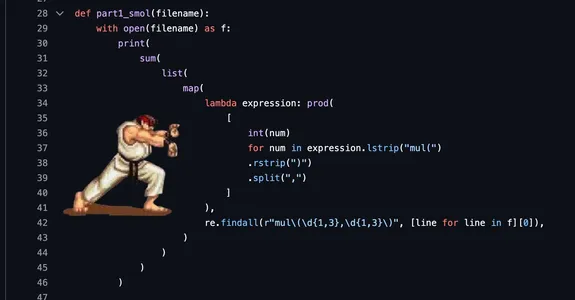day 3
pretty nice day 3 question, and especially nice to those who can wield the finite state automata, otherwise known to most programmers as regular expressions
i’m curious to see regular expression usage in different languages today here, but also potentially some solutions that will be regular expressionless
lets dive into it
click to view my solution
given the sample input:
xmul(2,4)%&mul[3,7]!@^do_not_mul(5,5)+mul(32,64]then(mul(11,8)mul(8,5))assuming instructions is the above as one big string,
part 1
validate = fn instructions ->
Regex.scan(~r/mul\((?<a>\d*),(?<b>\d*)\)/, instructions)
|> Enum.map(fn [_match, a, b] ->
String.to_integer(a) * String.to_integer(b)
end)
|> Enum.sum()
end
validate.(instructions)regular expression time, techncially i’m using named capture groups here, but the Regex.scan function i’m
using from elixir doesn’t really make use of them, but does still give me the capture groups seperate to the entire matched string
~r/mul\((?<a>\d*),(?<b>\d*)\)/to break down the regex though, i expect to match on some section of the string that starts with mul,
then an opening parentheses (needed to escape it with \)
then, here is where i use actual parentheses to section out any number of digits, followed by a comma, and then any number of digits, ensuring that it ends with an actual closing parentheses at the end
the output of Regex.scan on my input, yields:
[
["mul(2,4)", "2", "4"],
["mul(5,5)", "5", "5"],
["mul(11,8)", "11", "8"],
["mul(8,5)", "8", "5"]
]so, mapping over that with:
|> Enum.map(fn [_match, a, b] ->
String.to_integer(a) * String.to_integer(b)
end)will give:
[8, 25, 88, 40]which we simply Enum.sum on, to get 161, the answer for part 1!
part 2
String.split("do()#{instructions}", "don't()")
|> Enum.map(fn instructions ->
[_ignore | rest] = String.split(instructions, "do()")
rest |> Enum.join()
end)
|> Enum.join()
|> then(fn instructions ->
validate.(instructions)
end)so, part 2 throws in some interesting clauses about some do() and don't()s turning off the multiplying,
and i thought to myself, maybe can i just string split on the don't(), and then string split on the do(),
and then anything that is to the left of the do(), is valid
so that is exactly what this code does, i throw in a do() at the start of the instruction string, as
the question states this is the case, so my string splitting works, and then just reconstruct a string
that is only the sections that should be turned on, and run that through the validate function from part 1
curious to see if anyone else came up with this solution, or if i’m ✨ special ✨
my mum calls my special so i must be
the full solution can be found [here]
others
[DanielPower/AdventOfCode] rust[M-ArafatZaman/advent-of-code-2024] pythonrust has no regex, so as expected, the
regexcrate makes an apperancepart 2 is tidy! it does seem like you came back to clean this up at a later date to use named capture groups, tidy tidy!
i see its one regular expression doing the job of finding dos, donts, and muls, and once you run into a do / dont, you either enable or disable, and when running into a mul, you check the enabled state to see if you should bother calculating the value and adding it to the total
v-nice
[mynameisgump/advent-of-code] pythonno capture groups here, but a nice string split on the match, mapping to int, and adding, does the trick!
same trick as dan had with
enabled, while looping through matches, that you’ve calledincludetidy
[ThatGravyBoat/Advent-of-Code-2024] rusthello ethan, hopefully leaving more than just spaghetti emoji for you this time around, my apologies :D
part1_smol, so compacti know you have it indented this way because of the fact that its one single expression, but

just had to reference indentation hadouken
nice part 2, similar regular expression / state system to others
good job gump
[ShevinuM/Advent-of-Code-2024] golangtidy, i like that here a match is being used on the values, if its just a dont or do, do the active flip, and if its not either, its the third case in which its only possibly mul
nice
i feel like for people who pull out regex, i have not much extra to say over what i’ve already said
[Mudkip/AdventOfCode] elixirfirst golang solution, lets get into it
and it looks like i’m not special!
shevinu also pulling out the string split secret for part 2!
and using part 1 as a function wholesale in part 2
very nice
pretty compact for go solution, looks like golang has a pretty decent expressive regular expression builtin as well
nice
[mwln/aoc] luamudkip out here with 130 lines of elixir
but also, mudkip out here not touching regex!
full on elixir state machine logic being pulled out here today, so even though this is not winning for lines of code by far, its winning from a cool perspective
defmodule Switch do defstruct state: :empty, open: true, prepare: nil @state_transitions %{ empty: %{entry: "d", next_state: :d}, d: %{entry: "o", next_state: :o}, o: %{entry: "n", next_state: :n}, n: %{entry: "'", next_state: :quote}, quote: %{entry: "t", next_state: :t} } def read_token(%Switch{state: state} = switch, entry: "(") when state in [:o, :t] do .. def read_token(%Switch{state: :lb} = switch, entry: ")") do .. def read_token(%Switch{} = switch, entry: entry) do .. end defmodule Multiplier do defstruct [:x, :y, state: :empty] @state_transitions %{ empty: %{entry: "m", next_state: :m}, m: %{entry: "u", next_state: :u}, u: %{entry: "l", next_state: :l}, l: %{entry: "(", next_state: :lb}, x: %{entry: ",", next_state: :y} } def read_token(%Multiplier{state: state} = multiplier, entry: entry) when is_integer(entry) and state in [:lb, :x, :y] do .. def read_token(%Multiplier{state: :y} = multiplier, entry: ")") do .. def read_token(%Multiplier{} = multiplier, entry: entry) do .. endtidy bit of state logic here, its def. a bit chunky but i had to show it here
not half bad for someone who has not touched elixir outside of this years aoc!

[nint8835/advent-of-code] f#marty getting jiggy with some gsub replacements to make his later code betta
seems like you’re using lua patterns here too, which look obviously very similar to regex, maybe not as full featured?
regardless, very cute 27 lines of lua out here today, i like this one
[evaan/AdventOfCode] golangi see also some cleanup from riley here as well, same as dan
(i totally wasn’t sitting at a coffee table alongside both of you yesterday watching you two discuss this)
let instructionRegex = Regex( @"((?'instruction'mul)\((?'a'\d+),(?'b'\d+)\)|(?'instruction'do)\(\)|(?'instruction'don't)\(\))" )so you have a capture group regex, cool, what’re you going to do with that riley
let (|Do|Dont|Mul|) (matchVal: Match) = match matchVal.Groups["instruction"].Value with | "do" -> Do | "don't" -> Dont | _ -> Mul(int matchVal.Groups["a"].Value, int matchVal.Groups["b"].Value)what in tarnation kinda syntax you pulling out here
even though you explained this to me, i still have yet to fully grok what is happening here, but i can show off what this lets you do to other folk:
let partA = inputData |> instructionRegex.Matches |> Seq.map (function | Do -> 0 | Dont -> 0 | Mul(a, b) -> a * b) |> Seq.sumjust mapping over super clean values that make it look like
Do/Dont/Mul(a, b)have become first class statements in your language, i guess its not look like, they just are??? nicef# is sure freaky, thank you riley
[ncashin/aoc2024] elixirsome regular-expressionless code, nice!
very hand rolled, expecting things at exact indexes, but honestly still pretty compact and to the point
and always cool to see both part 1 & 2 coming together in the same block of code
clever evan
[djrideout/advent2024] rustnatalie elixir natalie elixir
natalie took time away from climbing the wall at the cove to write this code, i feel so blessed
def get_mul_value(string) do Regex.scan(~r/mul\(\d+,\d+\)/, string) |> List.flatten() |> Enum.map(&Regex.scan(~r/\d+/, &1)) |> List.flatten() |> Enum.map(&String.to_integer/1) |> Enum.chunk_every(2, 2, :discard) |> Enum.map(fn [a, b] -> a * b end) |> Enum.sum() endusing regex here, but could def. use some features of regex to do the breaking apart of stuff for you
see my code for how to do that :)
(i’m cheeky)
[GreyGrisGrey] python24 lines of code for both part 1 and two in rust! woah
very tidy, a function to do the calculating based off of a simple regex with captures, but your part 2, you use a regular expression to do a cleanup of the input data to remove bits that are dont()!
very clean, feels similar to mine and shevinu’s string split trick, but more compact using regular expressions for said trick
good job
[ericthomasca/adventofcode2024] golanganother regular-expressionless solution!
honestly its verbose, but in a way that’s quite easy to read
having all of the variables at the top before you start iterating through the chars in the line is cool
and the psuedo regular expression system you’ve come up here with the
matcher = "mul(.,.)"systemsimple, long, but simple
[omega7379/Advent-of-Code] pythona golang regex solution, a bit longer that others, but looking good!
interesting approach here to do the cleanup myself and shevinu did via a method that it seems could be done to just parse through the string
nice regardless!
[hkings google sheets] sheetsglad to still see neiro here with us!
very nice and simple python solution, very to the point
only about 25 lines of actual code with comments removed
nice
[ranguli/advent-of-code] cppcell
B:14is just, ‘Pain’i’m not going to say much, other than if you’re here and you are not hamzah, check this sheet out
[terales/advent-of-code] pythonc++ solution pulling out the same steps seen before, regex, then iterator that does matching with a little state
thanks jish
[STollenaar/AdventOfCode] golangthank you for switching your input to be in a file rather than inline! :D
nice regex solution
i have so little to say at this point, people see this, know to reach for regex, and all come up with the same regex!
obviously, commendation for using capture groups, makes reading the code and your inners of loops clean
last, but not least, we have sven!
with a go solution!
that looks like other solutions!
good job sven
i started this on day 8, after just finishing day 2s ramble, and now onto starting day 4!
currently drinking at daniel’s apt. , pumping these out as fast as i can

maria just got behind me and has fallen asleep
say goodnight maria
any thoughts about any of the above?
reach out:

wait its actually clean down here
